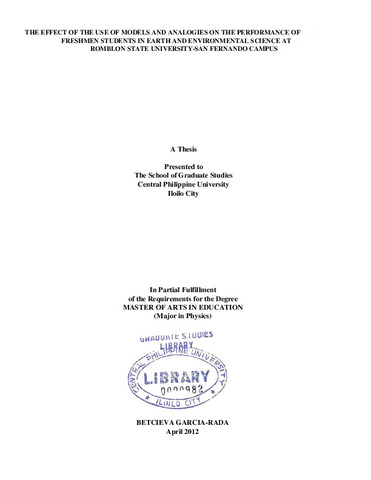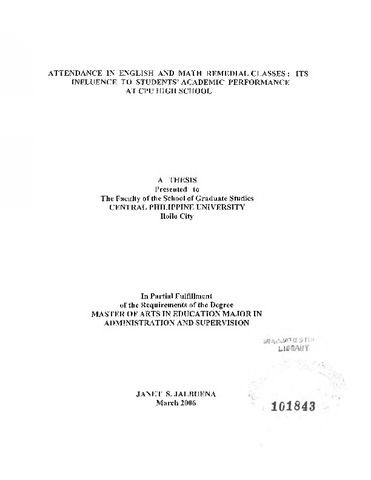| dc.description.abstract | This study aimed to find out the knowledge about teaching strategies, career commitment and teaching competence of engineer-teachers in engineering schools in Panay.
In consonance with the objectives of the study, it was hypothesized that the levels of the continuing education experiences, knowledge about teaching techniques, career commitment and teaching competence of the engineer-teachers vary according to their sex, age and civil status and their continuing education experiences and knowledge about teaching techniques are related to their career commitment and teaching competence.
This study made use of the descriptive-relational method with one-shot survey design. Complete enumeration of the sixty-five full-time engineer-teacher faculty members of these schools who participated served as the respondents of the study.
Data were collected using a questionnaire and were computer-processed using the Statistical Package for the Social Sciences (SPSS) for MS Windows 10.0 software. The profile of the respondents were analyzed using percentages and frequency distribution. The variation in the levels of the continuing education experience, knowledge about teaching techniques, career commitment and teaching competence of the engineer- teachers according to their sex, age and civil status and the relationship between their career commitment and teaching competence and their continuing education experience and knowledge about teaching techniques and methods were analyzed using z-test for difference between proportions, Gamma and Pearson’s r.
Findings
The engineer-teachers of engineering schools in Panay were generally males, married and middle-aged.
The engineer-teachers had an average of 15.192 years of teaching experience; had attended an average of three trainings attended in the last five years; had three and a half years of professional experience; and, had earned an average of 8.83 units in education. The engineer-teachers had an excellent knowledge about the different teaching techniques and methods with a mean score of 13.03 out of 15 items test about techniques. Specifically, their knowledge about cooperative learning, experimenting, discussion, student research, team teaching, problem solving, peer tutoring, field study, and lecture was high.
The engineer-teachers also had a high level of career commitment. The same is true with their level of commitment in three sub-categories namely: dedication, loyalty, and identification. Moreover, the majority of them had an outstanding level of teaching competence.
The data further show that the number of years of teaching experience of the engineer-teachers did not significantly vary according to their sex, age and civil status. There was also no big disparity in the number of relevant trainings attended; length of professional experience; and, in the number of education units earned before teaching in the College of Engineering between sex groups, age groups and civil status groups.
On the other hand, there were more male than female engineer-teachers who had excellent knowledge about teaching techniques, while there were more female than male engineer-teachers who had very good knowledge of teaching techniques.
Almost all of the engineer-teachers, regardless of sex, had a high level of career commitment in terms of dedication and loyalty to their work. However, the difference between proportions of male and female engineer-teachers in the high category of level of career commitment in terms of identification revealed that female engineer-teachers have a little higher level of identification with their work as teachers and over-all commitment to their teaching career in the College of Engineering than the male engineer-teachers.
Almost the same proportion of the engineer-teachers had very satisfactory and outstanding teaching competence regardless of their continuing education experiences, such as attendance to relevant trainings; number of years of professional experiences before teaching; and number of education units earned.
The study further revealed that the longer the engineer-teachers’ stay experience in teaching, the more they are dedicated to their teaching profession. Their loyalty to the teaching profession peaks at their 10th -19th year in teaching. The more experienced they are, the more they are committed to their teaching profession.
The engineer-teachers’ level of career commitment varied according to their attendance in relevant trainings. Those who had attended trainings were more loyal to their schools than those who had not attended any training. No significant difference however was noted between the two groups in their level of commitment in terms of dedication, identification and over-all commitment.
Furthermore, no significant difference in the level of their commitment in terms of dedication, loyalty, identification and over-all commitment was also noted between those who had professional experience prior to their teaching career and those who had no professional experience.
The data further show a significant relationship between age and teaching competence of the engineer-teachers. There were more female than male engineer teachers who had outstanding teaching competence, while there were more male than female engineer-teachers who had very satisfactory teaching competence. As to civil status, no big difference in the teaching competence was noted between the single and the married engineer-teachers, although, there were more single than married engineer teachers with outstanding teaching competence.
The findings also revealed a positive relationship between career commitment and teaching competence of the engineer-teachers. Those with high level of dedication, loyalty, identification and over-all commitment to their teaching profession, also had high teaching competence.
Conclusions
On the basis of the findings of this study, it is reasonable to conclude that:
Engineer-teachers of Panay are mostly males, married, middle-aged, experienced teachers with professional experience, highly committed and competent in their teaching career, and had excellent background in teaching techniques.
The number of years of teaching in the college of engineering, number of years of professional experience prior to teaching and number of units in education earned varied according to the age of the engineer-teachers. The middle-aged and older engineer-teachers had an edge over the younger ones in terms of teaching and professional experience, as well as in equipping themselves for their teaching career such as having units in education.
The level of knowledge about teaching techniques of engineer-teachers varied according to their sex, with male engineer-teachers having a better grasp of teaching techniques that are best suited for engineering students.
The teaching competence of the engineer-teachers varied according to their age, in favor of the older ones. The older one becomes, the more competent he gets.
Career commitment, specifically, the engineer-teachers’ identification with their work as teachers is related to their teaching competence. The engineer-teachers’ identification with their work as teachers helps them become good teachers. | en_US |





